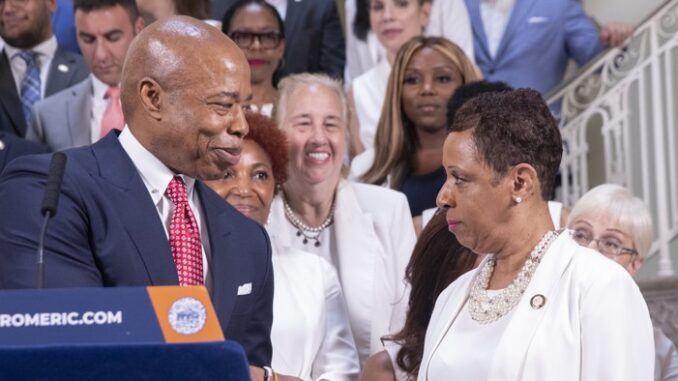
By Shlomie Katash
On Feb. 28, the New York City Council officially joined a lawsuit filed by the Legal Aid Society that would require Mayor Eric Adams’ administration to institute laws that would expand access to the City Family Homelessness and Eviction Prevention Supplement (CityFHEPS) rental voucher program.
The laws endured a lengthy legislative battle last summer amid broader budgetary clashes–the package was passed in May, vetoed in June, and overridden in July, leading to its official codification.
Adams justified his opposition by claiming the bills would cost $17 billion over five years and open up voucher eligibility to the point of greatly diminishing the program’s efficiency. The bills’ proponents maintained that by expediting and increasing rental assistance, the growing burden on the city’s shelter system, induced by an influx of migrants, would be partly alleviated as people would be able to move out. They point to analysis from Win, the city’s largest family shelter, that demonstrated that providing a voucher is less than half the price to the city as placing people in a shelter, thereby arguing the bills would only cost $10.6 billion over five years.
The administration has disputed this finding, arguing that the savings “would be minimal because our data clearly show that most [Department of Homeless Services] shelter entrants do not become homeless due to formal eviction,” per a document released by the Department of Social Services (DSS).
Reports that Adams would refuse to implement the laws first surfaced on Nov. 26 by City Limits. In the time since, the City Council has repeatedly threatened the administration with legal action if they did not reverse course. However, when the DSS confirmed on Dec. 15 that they have no plans to institute the laws, the Council authorized Speaker Adrienne Adams to sue the city. Speaker Adams chose to have the Council represented in an existing lawsuit alongside the Legal Aid Society, who were suing on behalf of two plaintiffs who had legal access to the CityFHEPS program but were administratively closed off.
Though this is the first time the City Council and Adams have engaged in a legal battle, the two bodies have clashed in the courts previously. Mayors Rudy Giuliani and Bill de Blasio each had legal disputes with the Council once during their tenures, and Mike Bloomberg engaged in multiple lawsuits with the legislative branch multiple times during his time as mayor.
A precedent in a case such as the one filed on Feb. 28 would be in 2006, when the courts upheld Bloomberg’s ability to not enforce a law that would have required companies that do business with NYC to extend equal benefits to same-sex partners as they did with heterosexual spouses. During a time when same-sex marriage was not legalized in NYC and the United States, the court struck down the law itself and stated that Bloomberg did not need to enforce a law he deemed illegal while the courts have yet to rule on it.
Adams has continuously argued against the laws on their merits and legality and blocked them from being established. As grounds for the latter, he has asserted that New York State’s Social Services Law preempts it and the laws’ high costs designate them as necessitating a referendum to become law.
The City Council and the bills’ proponents disagree on both fronts, pointing to other modifications to the CityFHEPS program being passed in recent years without any concerns regarding preemption or the need for a referendum being raised. Additionally, they have contended that, despite the 2006 decision, Adams cannot unilaterally declare the laws illegal without a challenge in the courts and still refuse to enforce them.
“While the mayor can assist the Council in proposing legislation, if and when a Mayor’s veto is overridden, his role as policy maker ends and his law enforcement role begins,” council lawyers wrote in one document, according to City & State. “Regardless of whether the local law aligns with his policy preferences, he is duty-bound to implement the law. Actions to the contrary unlawfully usurp legislative authority and violate the separation of powers doctrine.”
The courts’ decision in this case could have rippling impacts on the future of policymaking in NYC. Though a legal expert told City & State that they don’t expect the courts to rule that the Council overstepped their authority in passing the laws, whether the laws and the 2006 precedent are upheld will shape the next actions from Adams and the City Council. Further escalation could lead to a deterioration in the working relationship of Mayor Adams and Speaker Adams, who maintain that they are still “cordial” despite an increase in their public disputes, according to NY1.
